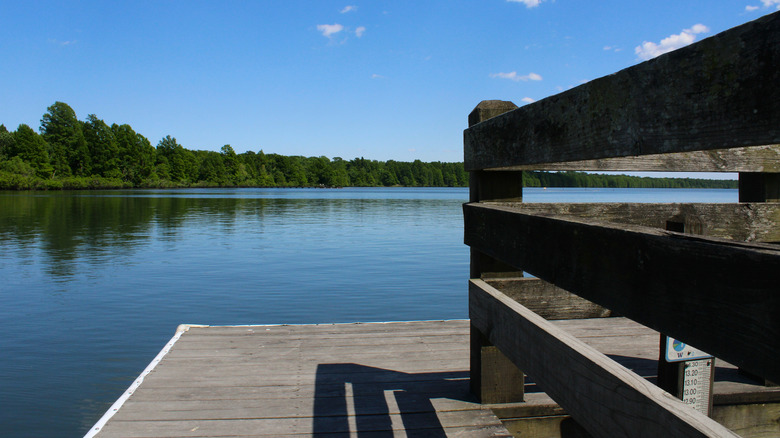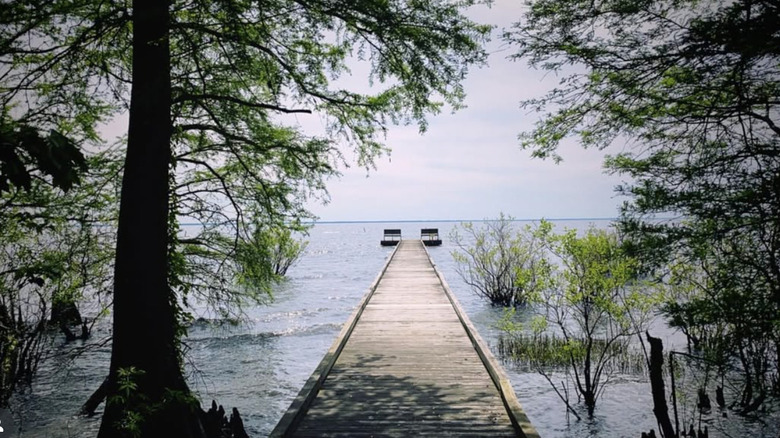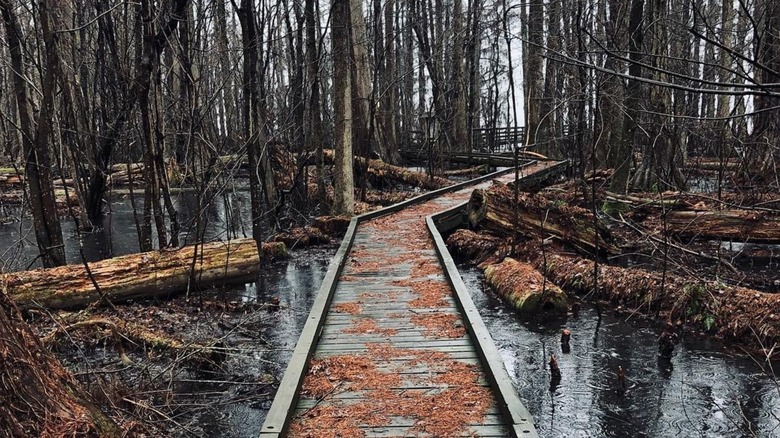
North Carolina isn't short of headline attractions (including the most overpriced in the world). From the laid-back beach life in towns like Wilmington, through its major cities like Raleigh and Charlotte,
and on to the Blue Ridge Mountains, there's no shortage of amazing destinations. But hidden within the state's lesser-visited coastal plains lies Pettigrew State Park, a quiet slice of natural lakeside splendor, simmering with history stretching back thousands of years.
The park itself wraps around Lake Phelps, North Carolina's second-largest natural body of water covering over 16,000 acres, and offers a further 5,830 acres of exploration and history on its shores. The park's lack of traffic owes itself to the sparsity of the region — the vast majority of settlements nearby are the epitome of small-town America, with the nearest large city of Greenville being 75 miles away. That quiet atmosphere, along with its flora and fauna, has made it a treasured secret for fishermen and nature enthusiasts.
But its beauty is only one facet of Pettigrew State Park's wonder. It may be named for the famous Confederate General whose family estate resided on its shores, but its importance to Native American tribes dwarfs the Civil War by 11,000 years. Hundreds of artifacts have been discovered in and around the lake, including over 30 sunken canoes carbon-dated to as early as 2,430 B.C.
Read more: Secret US Beach Towns That Rival The Caribbean
A Lakeside Escape With A Historic Twist

At its core, Pettigrew State Park and Lake Phelps are the quintessential lakeside escape. Active visitors have 9 miles of trails to walk or cycle, with most paths tracing the rim of the lake or winding through the giant cypress trees, tulip poplars, and gargantuan swamp oaks. The lake itself remains remarkably shallow throughout, making it a safer option for those with children. Canoes, kayaks, paddleboards, and even small boats are welcome on the water. In fact, those with canoes and kayaks can take advantage of the set canoeing trails, getting them closer to the abundant wildlife. For a small park, its wildlife is immense. Over 50 species of birds have been sighted in Pettigrew, as well as plenty of whitetail deer, black bears, minks, and raccoons.
While most of the Native American artifacts discovered in Lake Phelps are in museums, research labs, or have been reburied, two of them are on display in the park's information center — although differing reports suggest it may be temporarily closed as of June 2025. For a grasp of the area's slightly more recent history, the Somerset Place plantation site offers a sobering experience. Once one of the largest plantations in North Carolina, as many as 850 slaves worked the land during its 80-year operation. After sitting in disrepair for decades, it's been rebuilt as it was, offering tours of the site that depict the plantation's story from the perspectives of all involved.
Go Off The Beaten Path At Pettigrew State Park

Getting to Pettigrew State Park requires a little effort. Its relative seclusion means you're unlikely to stumble upon it without intention. The park lies about 6 miles off the Creswell junction on Highway 64, which is the primary road for approaching the popular Outer Banks region, North Carolina's easternmost point. If you're approaching from one of the more prominent airports in the area, like Raleigh or Wilmington, the drive will take between two and a half and three hours. Greenville is around 90 minutes away, but it's unlikely you'd be flying there. Just ensure you arrive at the park before closing time. It opens at 8 a.m each day, but closes at 6 p.m between November and February, 8 p.m in March, April, May, September, and October, and 9 p.m during the summer months.
There are no hotels in the immediate vicinity, with Plymouth, a 30-minute drive away, offering the best options. The park does have its own 13-berth campsite that can (and should) be booked in advance. Interestingly, the campsite has become a cheaper accommodation option for those visiting the pricier Outer Banks. With campsites set at $27 a night, some travelers are opting to camp and drive the 90-minute ride to the beach towns. Restaurants are similarly limited, although there are a few options in nearby Creswell.
The intention of the visit will dictate where and what you do here. If you're making a beeline to the park, it's most likely that you'll be camping anyway and come stocked up. If you're stopping to see the lake and check out the plantation, it's likely you were heading to or from the Outer Banks anyway and can stock up on the way. If you are looking for more gorgeous lakes in North Carolina, check out the state's largest man-made lake that has thrilling swimming, boating, fishing, and camping.
Ready to discover more hidden gems and expert travel tips? Subscribe to our free newsletter for access to the world's best-kept travel secrets.
Read the original article on Islands.











